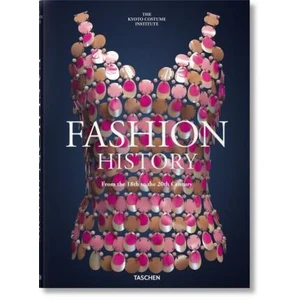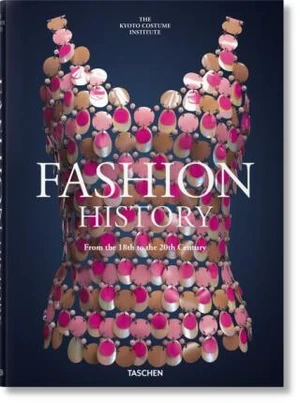Take an trip through three centuries of trend. In this spectacular collection from the Kyoto Costume Institute, one of the world’s most extensive clothing collections, the smartest minds and sharpest eyes in fashion studies walk us through the outer- and underwear, shoes, and accessories that have defined people around the world. Clothes define people. A person’s attire, whether it’s a sari, kimono, or business suit, is an essential code to his or her culture, class, personality, even faith. Founded in 1978, the Kyoto Costume Institute recognizes the importance of understanding clothes from sociological, historical, and artistic perspectives. With one of the world’s most extensive clothing collections, the KCI has amassed a wide range of historical garments, underwear, shoes, and fashion a
ccessories dating from the 18th century to the present day. Showcasing the Institute’s vast collection, Fashion History is a fascinating excursion through clothing trends from the 18th to the 20th century. Featuring impeccable photography of clothing expertly displayed and arranged on custom-made mannequins, it is a testimony to attire as “an essential manifestation of our very being” and to the Institute’s passion for fashion as a complex and intricate art form. The authors include some of the smartest minds and sharpest eyes in fashion studies: Akiko Fukai (Director and Curator Emeritus of the Kyoto Costume Institute), Tamami Suoh (Curator of The Kyoto Costume Institute), Miki Iwagami (Lecturer of fashion history at Bunka Gakuen University, Tokyo), Reiko Koga (former professor of fashion history at Bunka Gakuen University, Tokyo), and Rie Nii (Curator of The Kyoto Costume Institute). The Kyoto Costume Institute (KCI) collects and preserves outstanding examples of fashion through the centuries. It is one of the leading centers of fashion research, sharing its findings in both exhibitions and publications.
více
Nejlevnější produkt
56,59 € | Knihy Dobrovsky | In stock
Máte ve vašem obchodě lepší produkt?
Nejlevnější produkt
56,59 € | Knihy Dobrovsky | In stock
Máte ve vašem obchodě lepší produkt?
K dispozici v
Co říkají obchody
Knihy Dobrovsky
Take an trip through three centuries of trend. In this spectacular collection from the Kyoto Costume Institute, one of the world’s most extensive clothing collections, the smartest minds and sharpest eyes in fashion studies walk us through the outer- and underwear, shoes, and accessories that have defined people around the world. Clothes define people. A person’s attire, whether it’s a sari, kimono, or business suit, is an essential code to his or her culture, class, personality, even faith. Founded in 1978, the Kyoto Costume Institute recognizes the importance of understanding clothes from sociological, historical, and artistic perspectives. With one of the world’s most extensive clothing collections, the KCI has amassed a wide range of historical garments, underwear, shoes, and fashion accessories dating from the 18th century to the present day. Showcasing the Institute’s vast collection, Fashion History is a fascinating excursion through clothing trends from the 18th to the 20th century. Featuring impeccable photography of clothing expertly displayed and arranged on custom-made mannequins, it is a testimony to attire as “an essential manifestation of our very being” and to the Institute’s passion for fashion as a complex and intricate art form. The authors include some of the smartest minds and sharpest eyes in fashion studies: Akiko Fukai (Director and Curator Emeritus of the Kyoto Costume Institute), Tamami Suoh (Curator of The Kyoto Costume Institute), Miki Iwagami (Lecturer of fashion history at Bunka Gakuen University, Tokyo), Reiko Koga (former professor of fashion history at Bunka Gakuen University, Tokyo), and Rie Nii (Curator of The Kyoto Costume Institute). The Kyoto Costume Institute (KCI) collects and preserves outstanding examples of fashion through the centuries. It is one of the leading centers of fashion research, sharing its findings in both exhibitions and publications.

